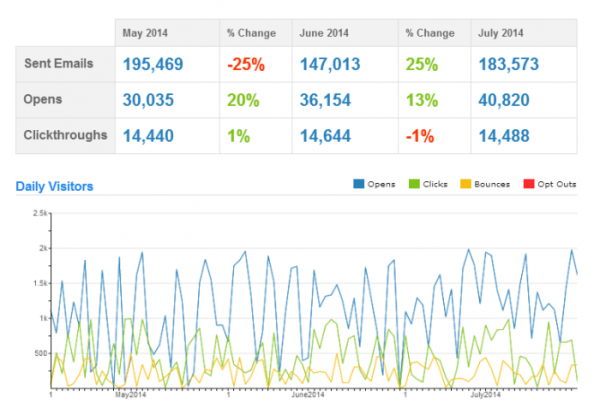 Figuring out the key performance indicators (KPIs) that are most important to your business is both an art and a science. What truly matters to your organization? That depends on your objectives, goals, and overall strategy. For many businesses, email campaigns may not be evaluated mainly by the revenue they bring in, or they might help the company’s profits in a more indirect manner.
Figuring out the key performance indicators (KPIs) that are most important to your business is both an art and a science. What truly matters to your organization? That depends on your objectives, goals, and overall strategy. For many businesses, email campaigns may not be evaluated mainly by the revenue they bring in, or they might help the company’s profits in a more indirect manner.
For a retailer, it might be pretty simple. Did the recipient click the “Buy Now” link? And did they actually buy? For a health insurance company, it’s more complex. The call to action might be to get the recipient to read an article about controlling blood pressure, in which case the number of clickthroughs and time spent on the site are key metrics – as well as the reduction in claims costs further down the line.
KPIs for Email
There are KPIs relevant to email marketing that you may want to track on a regular basis, including:
- New prospects. How many new prospects have you uncovered? This is tied to email list growth. This number includes any contacts added to your nurturing database so that your marketing team can build prospects’ interest over time (using email campaigns and other programs), progressively increasing their lead scores.
- Response rate. How much reach have you achieved? How many impressions as well as conversions did your email generate? Look at open and click rates as well as social sharing and forwarding, if available.
- Qualified leads. Of the leads you’ve generated, how many have been nurtured to pass a lead score threshold (usually a number agreed on by sales and marketing) that indicates they’re qualified and ready to be handed to sales?
- New customers: How many new customers did you your email marketing help generate? Tracking clickthroughs and conversions as well as online behavior is key to being able to attribute the number of closed sales to an email campaign.
- Total revenue: How much did you make from customers who were captured and nurtured using email? Again, measuring conversion will help you tie the dollars to the customer behaviors.
Remember, not all metrics are KPIs. Metrics measure all kinds of interesting information but KPIs are the metrics that are actually important to your business. KPIs should be tied to an objective, as well as quantifiable, and they should also be actionable, so you can take specific actions that will move the dial to improve them.
Funnel Reporting

With the right marketing automation solution, you can also follow email results using a dashboard that provides an at-a-glance overview of key metrics for each campaign. By including trackable links in your email messages, you can look at results over time, understand which hours of the day or days of the week are the best times to send, compare month-to-month or year-over-year results, and look at overall trends as well as in-depth information about each email you’ve sent.

Benchmarks can be valuable for spotting trends and understanding some general information about the kinds of results other organizations in your industry are getting from their email programs. But don’t get too concerned about how your metrics compare with those of others. There are a lot of variables at work, and too many email marketers get hung up on doing “better” than everyone else rather than focusing on improving the metrics that really matter to their business success.
So, are your emails working? Are they getting the results you need? With an eye on the right email KPIs and dashboards, you can know for sure. And with all the valuable information you gather, you can fix a failing program, expand a strong performer, and continually improve the results of every email campaign you develop.